Colder temps bring flu worries, fall allergies, dry skin and more
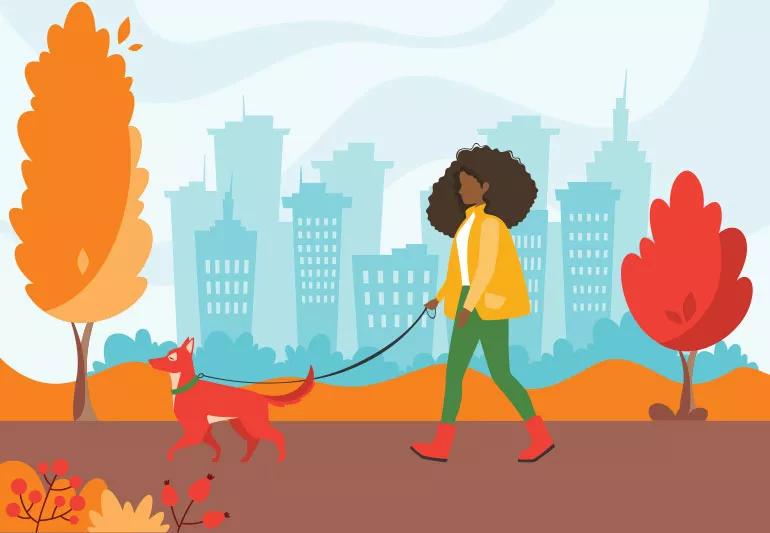
Image content: This image is available to view online.
View image online (https://assets.clevelandclinic.org/transform/185a8381-1070-4739-bcf5-9a3523082686/wmn-Walks-Dog-Autumn-1330688669-770x533-1_jpg)
Person walking dog in park during autumn weather.
It’s fall, y’all! Whether you’re eerily excited for spooky season, a full-fledged fan of football festivities or just here to enjoy all things pumpkin spice, it’s a time of year associated with joy and nostalgia. Unfortunately, it also brings more than a few health concerns.
Advertisement
Cleveland Clinic is a non-profit academic medical center. Advertising on our site helps support our mission. We do not endorse non-Cleveland Clinic products or services. Policy
Do you know how to take the best care of yourself and your family this time of year? From flu season and fall allergies to dry skin and Daylight Savings woes, here are a few things you need to know in order to enjoy autumn without worry.
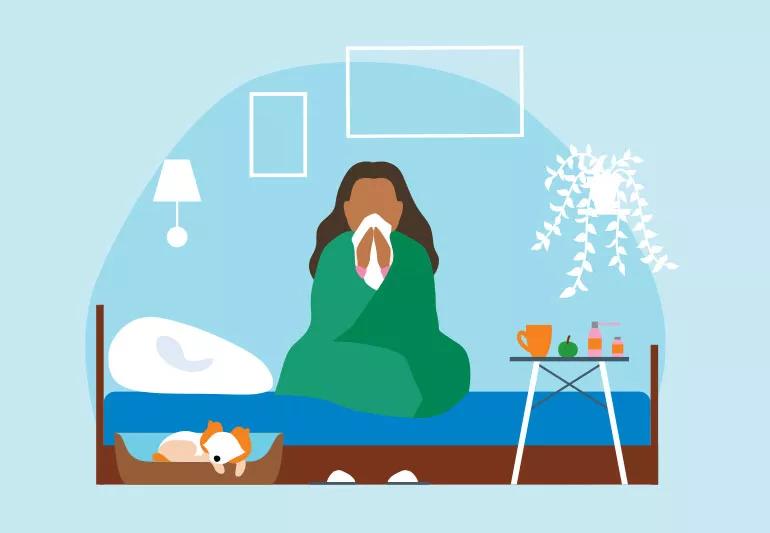
Image content: This image is available to view online.
View image online (https://assets.clevelandclinic.org/transform/b00b2b76-6e81-441d-b125-5ec257f8791d/flu-bed-contageous2-125930642-770x533-1_jpg)
In the U.S., fall is the start of flu season, and influenza can be unpredictable and serious, even if you’re healthy. Prevention goes a long way, whether that's getting a flu shot, practicing good hand hygiene or keeping yourself (or your kids) home if you're sick.
“Each year, influenza contributes to tens of thousands of deaths in the U.S.,” says infectious disease doctor Susan Rehm, MD. “That's why healthcare providers encourage people to consider steps like vaccinations and simple precautions to reduce their risk.”
COVID-19 is still circulating, and cases often rise in the fall and winter alongside flu season. If you’re considering vaccination, some doctors note that you can conveniently get a COVID shot and a flu shot during the same visit — even in the same arm if you choose.
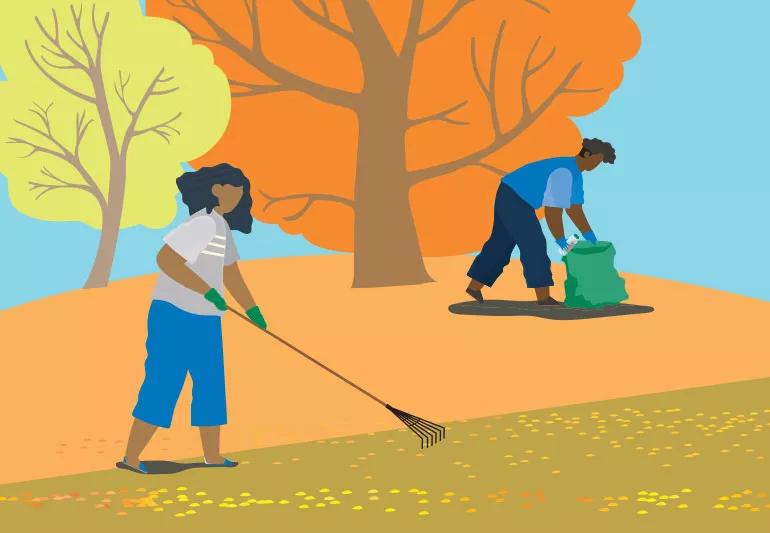
Image content: This image is available to view online.
View image online (https://assets.clevelandclinic.org/transform/28627599-f65d-495f-ac19-53594706023f/rakeLeaves-1323729054-770x533-1_jpg)
Those changing leaves make for a beautiful landscape … and a hellish lawn. Before you tackle tree debris, make sure you know how to rake leaves without hurting your back (including stretching beforehand!) with tips from chiropractor Andrew Bang, DC.
Advertisement
Yardwork can also strain your heart and increase your risk of heart attack, so pace yourself and learn to listen to your body. “Yard work is a workout. And like starting any new workout, you want to start slowly,” says cardiologist Nicholas Ruthmann, MD.
As beautiful as fall can be, it can also be agonizing for the estimated 15% to 30% of Americans prone to seasonal allergies. Allergic rhinitis (a.k.a. hay fever) happens when your body’s immune system reacts to pollen in the air. But you can keep your season as sniffle-free as possible, says allergist Mark Aronica, MD, by taking steps to prevent and cope with fall allergies.
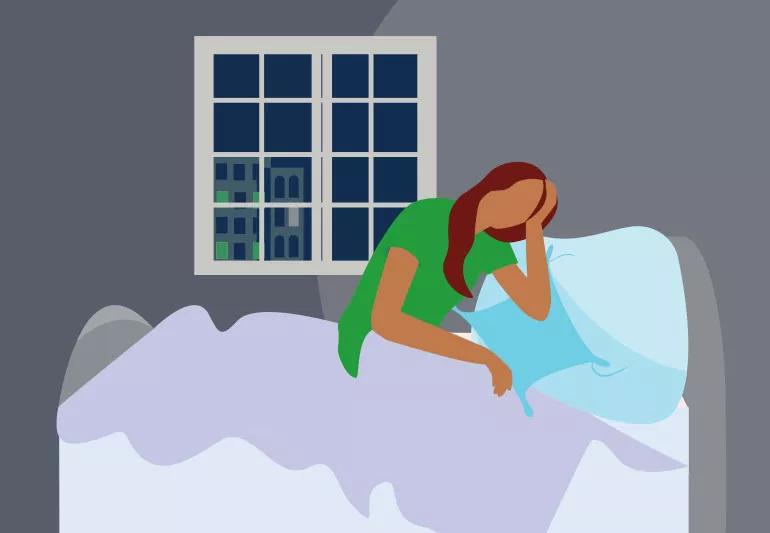
Image content: This image is available to view online.
View image online (https://assets.clevelandclinic.org/transform/61b1ac08-4849-47d0-9155-6eede3af04b2/wmnSadBed-1390248191-770x533-1_jpg)
As the days get shorter, there’s less sunlight to enjoy. And less sunlight can lead to seasonal affective disorder (SAD), a type of depression triggered by the change of seasons. It typically begins in late fall — but there are strategies you can deploy to ward it off.
Light therapy, for example, can boost sleep and help fight depression.
“Especially in the winter, our bodies react to the gray, cold weather and lack of natural sunlight,” explains psychologist Adam Borland, PsyD. “What light therapy does is compensate for the lack of exposure that we get from natural sunlight.”
The mid-autumn arrival of Daylight Savings Time can bring exhaustion, grogginess and grumpiness. Help your body adjust to the time change by rejiggering your sleep schedule in advance and then sticking to a schedule, saying no to naps and avoiding caffeine until you’ve settled into the new normal.
From camping trips to roasting marshmallows, bonfires have always been a popular way to enjoy the fall season — but they can be risky, too. Pediatrician Purva Grover, MD, explains how you can ensure that your whole family, especially kids and teens, knows how to practice proper bonfire safety in order to avoid burn injuries and smoke inhalation.
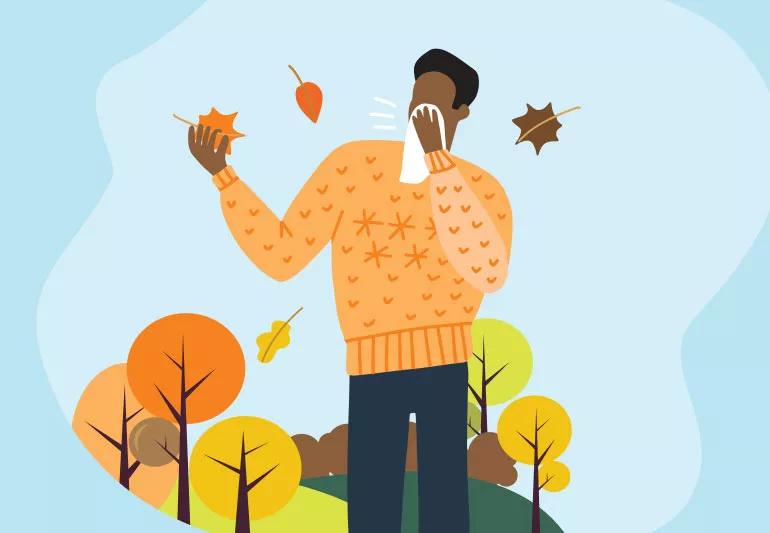
Image content: This image is available to view online.
View image online (https://assets.clevelandclinic.org/transform/d5fade0e-7391-434e-bd0c-1cc74d02f020/fallAllergies-1342308916_770x533_jpg)
Cold air is dry because it holds less moisture than warm air, and breathing cold, dry air can cause respiratory ailments like asthma, bronchitis, sinusitis and nosebleeds. “When the air is dry, your respiratory system just isn’t happy,” says pulmonologist Kathrin Nicolacakis, MD. “Even if you have no medical problems at all, you can suffer.”
She explains how a humidifier can help improve your breathing, reduce lung problems and just generally make your coexistence with cold weather all the more comfortable.
Dry air also means dry skin and hair. Before truly frigid temps set it, follow advice from dermatologist Alejandra Estemalik, MD and start showing your skin some extra love by choosing a good moisturizer (and using it regularly!). Take care of your hair, too, by brushing it gently, avoiding tight styles and keeping it conditioned to combat the cold.
Advertisement

Sign up for our Health Essentials emails for expert guidance on nutrition, fitness, sleep, skin care and more.
Learn more about our editorial process.
Advertisement
Different types of yoga poses, meditation and breathwork may help you feel more emotionally balanced
There’s very little scientific evidence that this alternative medicine practice works
Spoiler alert: Science doesn’t back the numerous health claims
This traditional Chinese medicine practice may boost mental health, immune function, balance and more
This ancient form of exercise can offer a physical and mental boost
Many claims lack science-backed research, but halotherapy is popular and considered safe
This five-day exercise plan for beginners includes three days of resistance training, two days of cardio and two days of rest
If you don’t have an underlying condition, cold plunges might help ease sore muscles, decrease inflammation and even heighten your focus
Prioritize your health by managing stress, strengthening your social connections and getting quality sleep
Bolsters, blankets, pillows and blocks can offer extra support, stability and comfort
Allergies, postnasal drip, asthma or reflux could be to blame for a cough that won’t quit